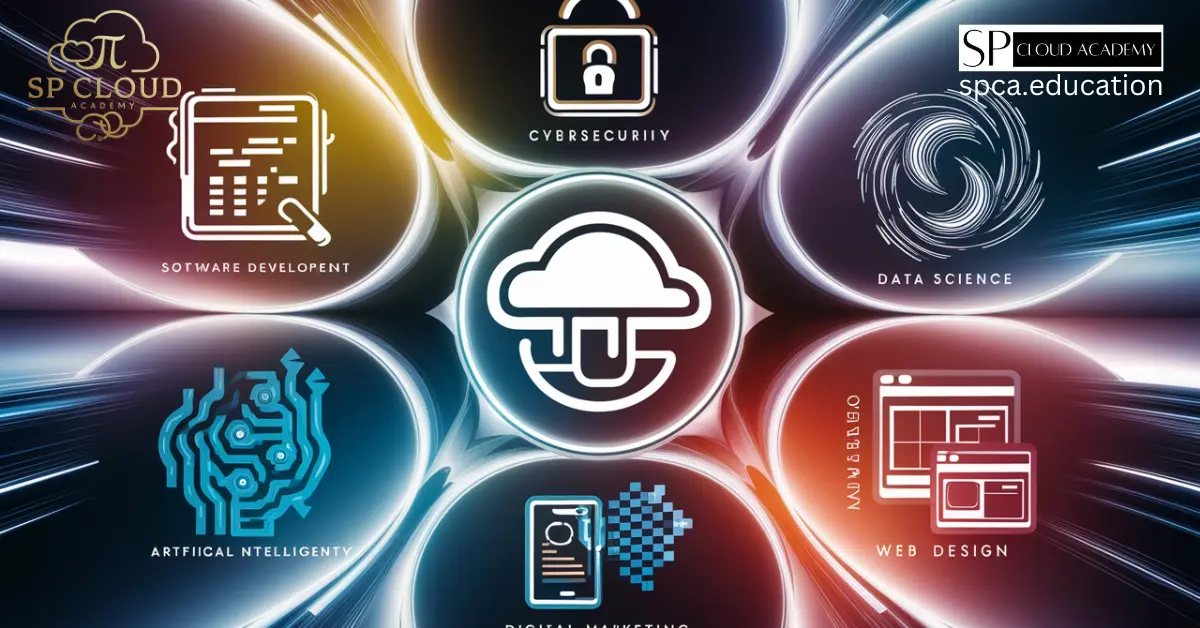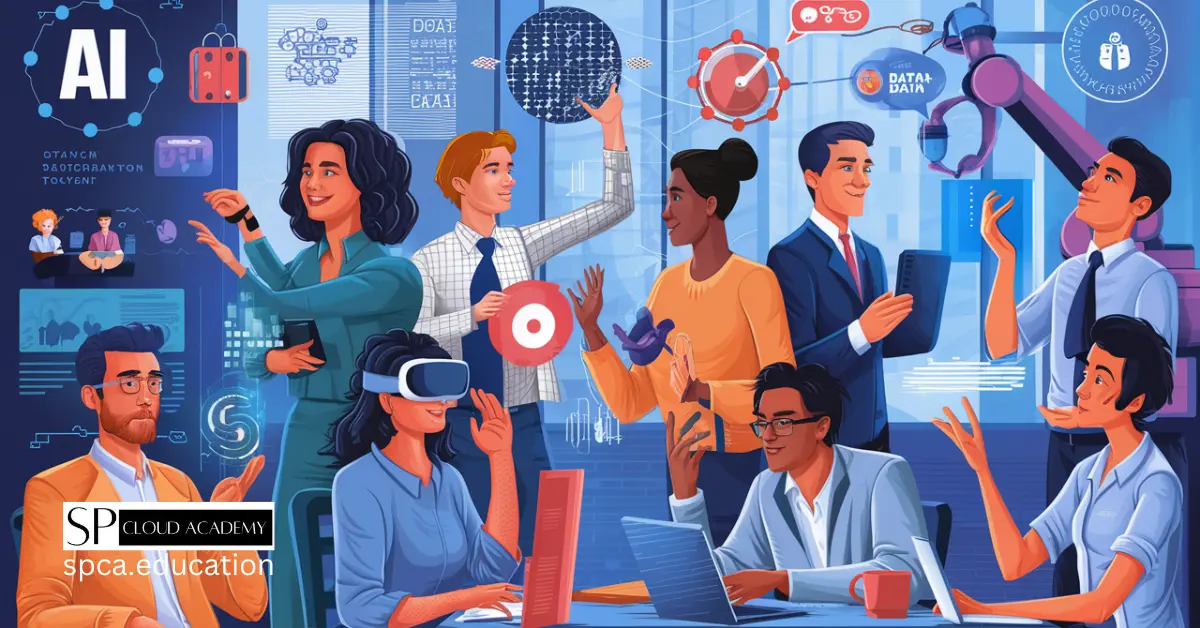Introduction to AI in IT Careers
Artificial Intelligence (AI) is not just a buzzword anymore; it’s a transformative force reshaping the landscape of IT careers. As technology evolves, the role of AI in various IT functions has become increasingly significant, leading to both opportunities and challenges for IT professionals. This article will explore how AI is changing the face of IT careers, the skills required to thrive in this new environment, and the future prospects for IT roles influenced by AI.
What is Artificial Intelligence?
Artificial Intelligence refers to the simulation of human intelligence processes by machines, especially computer systems. These processes include learning (acquiring information and rules for using it), reasoning (using rules to reach approximate or definite conclusions), and self-correction. AI can be categorized into two types: narrow AI, which is designed to perform a narrow task (e.g., facial recognition), and general AI, which has the ability to perform any intellectual task that a human can.
Brief History of AI in IT
The concept of AI dates back to ancient times, but it wasn’t until the mid-20th century that the field began to take shape with the advent of modern computers. In the 1950s and 1960s, pioneers like Alan Turing and John McCarthy laid the groundwork for AI research. The field experienced several cycles of hype and disappointment, often referred to as “AI winters.” However, the last decade has seen a resurgence in AI, fueled by advances in machine learning, big data, and cloud computing. Today, AI is a key driver of innovation in the IT industry.
The Intersection of AI and IT Careers
AI is increasingly being integrated into various aspects of IT, from software development to network management. This integration is not only automating routine tasks but also creating new opportunities for IT professionals to specialize in AI-related fields. As AI becomes more prevalent, IT careers are evolving to include roles focused on AI development, implementation, and maintenance. Understanding the intersection of AI and IT careers is crucial for professionals looking to stay relevant in this rapidly changing field.
The Role of AI in Traditional IT Jobs
Automation and Its Impact on IT Roles
One of the most significant ways AI is impacting IT careers is through automation. AI-powered tools and platforms are automating routine and repetitive tasks that were once handled manually by IT professionals. For example, AI can automate code testing, bug fixing, and system monitoring, allowing IT teams to focus on more complex and strategic tasks. While automation can lead to increased efficiency and productivity, it also raises concerns about job displacement. IT professionals need to adapt by developing skills that complement AI, such as problem-solving, creativity, and critical thinking.
AI-Powered Tools in Software Development
AI is revolutionizing software development by introducing new tools and techniques that streamline the development process. AI-driven code generators, for instance, can write code based on natural language descriptions, reducing the time and effort required to develop software. Additionally, AI can assist in identifying bugs and vulnerabilities in code, leading to more robust and secure software. As a result, software developers are increasingly working alongside AI tools, leveraging their capabilities to enhance their work and deliver better results.
AI in Network Management and Cybersecurity
Network management and cybersecurity are two areas where AI is making a substantial impact. AI-powered tools can analyze vast amounts of network data in real-time, identifying potential security threats and anomalies that might go unnoticed by human analysts. This proactive approach to cybersecurity allows organizations to respond to threats more quickly and effectively. In network management, AI can optimize network performance, predict potential issues, and automate routine maintenance tasks, freeing up IT staff to focus on more strategic initiatives.
Emerging IT Careers Driven by AI
AI and Data Science
Data science has emerged as one of the most sought-after careers in the IT industry, thanks to the rise of AI. Data scientists use AI and machine learning algorithms to analyze large datasets, uncovering patterns and insights that drive business decisions. As organizations increasingly rely on data-driven strategies, the demand for skilled data scientists continues to grow. IT professionals with expertise in AI and data science are well-positioned to take advantage of this trend, making data science a lucrative and exciting career path.
Machine Learning Engineers: The New IT Experts
Machine learning engineers are at the forefront of AI innovation, designing and implementing machine learning models that power AI applications. These professionals need a deep understanding of algorithms, programming languages like Python, and frameworks such as TensorFlow and PyTorch. As AI continues to evolve, the role of machine learning engineers will become even more critical in developing cutting-edge AI solutions. This specialization offers IT professionals the opportunity to work on some of the most exciting and challenging projects in the industry.
The Rise of AI Ethics Consultants
As AI becomes more integrated into various aspects of society, ethical considerations are becoming increasingly important. AI ethics consultants are emerging as a new career path in the IT industry, helping organizations navigate the complex ethical issues associated with AI implementation. These professionals advise on topics such as bias in AI algorithms, data privacy, and the social impact of AI technologies. As the debate around AI ethics intensifies, the demand for AI ethics consultants is expected to rise, offering IT professionals a unique opportunity to influence the future of AI development.
AI and Cloud Computing: A New Horizon
Cloud computing has revolutionized the way businesses operate, and AI is taking this transformation to the next level. AI and cloud computing are a powerful combination, enabling organizations to deploy AI-powered applications at scale. IT professionals specializing in AI and cloud computing are in high demand, as they possess the skills needed to design, implement, and manage AI-driven cloud solutions. This intersection of AI and cloud computing presents exciting opportunities for IT careers, particularly in areas such as AI-as-a-Service (AIaaS) and cloud-based machine learning platforms.
Skills Required in the AI-Driven IT World
Essential Technical Skills
To succeed in the AI-driven IT landscape, professionals need to develop a strong foundation in technical skills. This includes proficiency in programming languages like Python and R, knowledge of machine learning algorithms, and experience with AI frameworks and tools such as TensorFlow, Keras, and Scikit-learn. Additionally, IT professionals should have a solid understanding of data science, cloud computing, and cybersecurity, as these areas are closely linked to AI.
The Importance of Soft Skills in an AI-Enhanced IT Environment
While technical skills are essential, soft skills are equally important in the AI-driven IT world. As AI takes over routine tasks, IT professionals will need to focus on problem-solving, creativity, and critical thinking. Communication skills will also be crucial, as IT professionals will need to explain complex AI concepts to non-technical stakeholders. Moreover, adaptability and a willingness to learn new skills will be key to staying relevant in a rapidly changing industry.
How to Upskill for AI-Integrated IT Roles
Upskilling is essential for IT professionals looking to thrive in an AI-integrated environment. This can be achieved through formal education, such as enrolling in AI and machine learning courses, or through self-directed learning using online platforms like Coursera, edX, and Udacity. Networking with industry peers, attending conferences, and participating in AI-related projects are also effective ways to gain practical experience and stay up-to-date with the latest trends and developments in AI.
The Future of IT Jobs in an AI-Driven World
Predictions for IT Careers in the Next Decade
The next decade is expected to bring significant changes to the IT job market, driven by advancements in AI. While some traditional IT roles may be automated, new opportunities will emerge in areas such as AI development, data science, and cybersecurity. IT professionals who embrace AI and continuously upskill will be well-positioned to take advantage of these opportunities. Additionally, the demand for AI-related roles is expected to increase across various industries, from healthcare and finance to manufacturing and retail.
The Potential of AI to Create New IT Jobs
Contrary to the fear that AI will lead to widespread job loss, there is growing evidence that AI will create new IT jobs. For example, AI developers, machine learning engineers, and AI ethics consultants are all emerging roles that did not exist a few years ago. As AI continues to evolve, it is likely that new job categories will emerge, requiring a combination of technical expertise and creative problem-solving skills. This presents an exciting opportunity for IT professionals to explore new career paths and contribute to the development of cutting-edge AI technologies.
How AI Might Reshape IT Job Markets Globally
AI is likely to have a profound impact on IT job markets around the world, leading to shifts in demand for certain skills and expertise. While some regions may experience job displacement due to automation, others may see an increase in demand for AI-related roles. Global IT job markets may become more competitive, with organizations seeking top talent with AI expertise. IT professionals who are willing to relocate or work remotely may find new opportunities in global markets, as AI continues to break down geographical barriers in the IT industry.
AI’s Impact on IT Career Progression and Salaries
How AI Influences Career Paths in IT
AI is reshaping career paths in the IT industry, offering new opportunities for advancement and specialization. IT professionals with AI expertise are likely to see accelerated career progression, as organizations prioritize AI-driven initiatives. Additionally, roles focused on AI development and implementation are expected to become more prominent, offering IT professionals the chance to work on innovative projects that drive business success. As AI becomes more integrated into IT workflows, career paths are likely to become more dynamic and diverse.
The Effect of AI on IT Salaries
The rise of AI is also influencing salaries in the IT industry. Professionals with AI expertise are in high demand, and as a result, they can command higher salaries compared to their non-AI counterparts. For example, data scientists and machine learning engineers are among the highest-paid roles in the IT industry. As AI continues to grow in importance, it is expected that salaries for AI-related roles will continue to rise, making AI a lucrative career choice for IT professionals.
AI Certifications and Their Importance
Certifications are becoming increasingly important for IT professionals looking to advance their careers in the AI-driven world. AI certifications, such as those offered by Google, Microsoft, and IBM, provide formal recognition of an individual’s expertise in AI and related technologies. These certifications can enhance a professional’s resume, making them more competitive in the job market. Additionally, certifications can serve as a valuable learning tool, helping IT professionals stay up-to-date with the latest AI trends and best practices.
The Ethical and Social Implications of AI in IT
Addressing Bias in AI Algorithms
One of the most pressing ethical concerns associated with AI is the potential for bias in AI algorithms. Bias can occur when AI systems are trained on data that reflects existing societal biases, leading to unfair or discriminatory outcomes. IT professionals have a responsibility to ensure that AI algorithms are designed and implemented in a way that minimizes bias and promotes fairness. This involves carefully selecting training data, regularly testing AI systems for bias, and implementing corrective measures when necessary.
AI and Privacy Concerns in IT Roles
AI has the potential to revolutionize the way organizations handle data, but it also raises significant privacy concerns. As AI systems become more sophisticated, they can analyze and process vast amounts of personal data, leading to concerns about data security and privacy. IT professionals working with AI must be vigilant in protecting user data, ensuring that AI systems comply with data protection regulations, such as the General Data Protection Regulation (GDPR). Additionally, organizations must be transparent about how AI systems use data, giving users control over their personal information.
The Social Responsibility of IT Professionals in the AI Era
As AI continues to reshape society, IT professionals have a social responsibility to ensure that AI technologies are developed and used in a way that benefits everyone. This includes considering the broader social impact of AI, such as its potential to exacerbate inequality or displace workers. IT professionals should advocate for ethical AI practices within their organizations, promote diversity and inclusion in AI development, and engage with policymakers to shape the future of AI in a way that is equitable and just.
AI in IT Education and Training
The Evolution of IT Curriculums with AI Integration
The integration of AI into IT curriculums is essential for preparing the next generation of IT professionals. Educational institutions are increasingly incorporating AI courses and modules into their IT programs, ensuring that students have the skills needed to succeed in an AI-driven world. This includes teaching foundational concepts in AI and machine learning, as well as providing hands-on experience with AI tools and technologies. As AI continues to evolve, IT curriculums will need to adapt to keep pace with the latest developments in the field.
Online Learning Platforms Offering AI in IT Courses
Online learning platforms, such as Coursera, edX, and Udacity, are playing a crucial role in making AI education accessible to a global audience. These platforms offer a wide range of AI and IT courses, allowing professionals to upskill at their own pace. Many of these courses are designed in collaboration with industry leaders, ensuring that the content is relevant and up-to-date. By taking advantage of online learning opportunities, IT professionals can stay ahead of the curve and acquire the skills needed to thrive in an AI-driven industry.
Preparing the Next Generation of IT Professionals for AI
Preparing the next generation of IT professionals for an AI-driven world requires a multi-faceted approach. Educational institutions must provide students with a strong foundation in AI and related technologies, while also emphasizing the importance of ethics and social responsibility. Additionally, hands-on experience with AI tools and real-world projects is essential for developing practical skills. Collaboration with industry partners can also help bridge the gap between academia and the workforce, ensuring that students are well-prepared for the challenges and opportunities of AI in the IT industry.
AI Tools and Platforms Transforming IT Workflows
Popular AI Tools Used in IT Today
A wide range of AI tools and platforms are transforming IT workflows, making it easier for professionals to develop, implement, and manage AI-driven solutions. Some of the most popular AI tools used in IT today include:
- TensorFlow: An open-source machine learning framework developed by Google, TensorFlow is widely used for developing AI models and applications.
- PyTorch: Developed by Facebook, PyTorch is another popular machine learning framework that is known for its flexibility and ease of use.
- IBM Watson: IBM’s AI platform offers a suite of tools for developing and deploying AI solutions, including natural language processing and machine learning capabilities.
- Microsoft Azure AI: Microsoft’s AI platform provides a range of services for building AI applications, including pre-built AI models and tools for machine learning and data analysis.
These tools are enabling IT professionals to harness the power of AI, driving innovation and improving efficiency across various IT functions.
How AI is Enhancing IT Productivity
AI is enhancing IT productivity by automating routine tasks, optimizing workflows, and providing valuable insights that drive decision-making. For example, AI-powered code generators can reduce the time and effort required to develop software, while AI-driven analytics tools can help IT teams identify trends and patterns in data more quickly. Additionally, AI is improving collaboration within IT teams by streamlining communication and project management processes. By leveraging AI, IT professionals can work more efficiently, delivering better results in less time.
AI in IT Project Management
AI is also transforming IT project management by providing tools and platforms that help teams plan, execute, and monitor projects more effectively. AI-driven project management tools can automate scheduling, track project progress, and identify potential risks, allowing project managers to make more informed decisions. Additionally, AI can analyze historical project data to provide insights and recommendations for future projects, helping teams improve their processes and deliver better outcomes. As AI continues to evolve, it is likely that its role in IT project management will become even more significant.
Case Studies: AI Transforming IT Careers
Success Stories of IT Professionals Adopting AI
There are numerous success stories of IT professionals who have embraced AI and transformed their careers. For example, a software developer who learned machine learning and transitioned into a role as a machine learning engineer, or a network administrator who specialized in AI-driven cybersecurity solutions. These professionals have been able to take advantage of the growing demand for AI expertise, advancing their careers and working on cutting-edge projects. These success stories demonstrate the potential of AI to open up new opportunities for IT professionals.
Real-World Examples of AI Impacting IT Roles
In addition to individual success stories, there are many real-world examples of AI impacting IT roles across various industries. For instance, in the healthcare industry, AI is being used to develop predictive models that help IT professionals manage electronic health records more efficiently. In the finance industry, AI is being used to develop algorithms that detect fraudulent transactions, enhancing the role of IT professionals in cybersecurity. These examples highlight the transformative impact of AI on IT roles, creating new opportunities and challenges for professionals in the field.
Lessons Learned from AI Integration in IT
As organizations continue to integrate AI into their IT workflows, there are several lessons that can be learned from the experience. First, it is essential to invest in upskilling and training for IT professionals, ensuring that they have the skills needed to work with AI technologies. Second, organizations must be mindful of the ethical implications of AI, implementing safeguards to prevent bias and protect privacy. Finally, collaboration between IT teams and other departments is crucial for the successful integration of AI, as it requires a multidisciplinary approach to achieve the best results.
Conclusion
The Ongoing Evolution of AI in IT
The integration of AI into the IT industry is an ongoing process, with new developments and innovations emerging regularly. As AI continues to evolve, it will undoubtedly have a profound impact on IT careers, creating new opportunities and challenges for professionals in the field. IT professionals who embrace AI, continuously upskill, and stay informed about the latest trends will be well-positioned to thrive in this dynamic industry.
Preparing for the Future of AI in IT Careers
Preparing for the future of AI in IT careers requires a proactive approach. IT professionals must be willing to adapt to the changing landscape, investing in education and training to stay ahead of the curve. Additionally, organizations must support their IT teams by providing access to the resources and tools needed to work with AI effectively. By working together, IT professionals and organizations can harness the power of AI to drive innovation and achieve success in the digital age.
Final Thoughts on the Impact of AI on IT Careers
The impact of AI on IT careers is significant and far-reaching. While it presents challenges, it also offers tremendous opportunities for those who are willing to embrace change and invest in their professional development. By understanding the implications of AI and taking steps to prepare for the future, IT professionals can position themselves for success in a rapidly evolving industry. The future of AI in IT is bright, and those who are ready to seize the opportunities it presents will be at the forefront of this exciting new era.
Books
- Your AI Roadmap: Actions to Expand Your Career, Money, and Joy
- Careers in Information Technology: Artificial Intelligence (AI) Engineer
See Also
-

From Clicks to Connections: Smart Ways to Combine Online and Offline Job Hunting
-

How to Turn Your Passion for Graphics into a Freelance Career
-

Technical Post vs. General Post in Job Sectors: A Detailed Explanation with Examples, Responsibilities, and FAQs
-

The Future of IT Support and Administration Careers: Trends You Can’t Ignore
-

The Power of Professional Communities: Why Joining One Can Transform Your Life
-

Top 7 Gig Work Opportunities in the ICT Sector You Can’t Ignore
